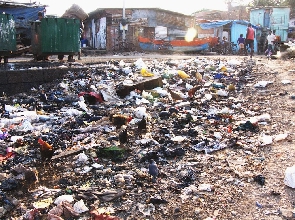Opinions of Thursday, 8 December 2022
Columnist: Philomena Esi Agudu
Redefining the sanitation narrative in Ghana
5 unforgettable strategies in this journey...
Read this in your mother’s angry voice at the time you were five years old playing friskily in the sand minutes after a refreshing bath:
The massive filth and exponential continuity of littering across the nation is not necessarily the clarion call for better sanitation.
To answer your question about where this is going maybe I should edit that statement anecdotally. Rewind:
Consider a young child at age five. It is assumed that this child naturally misunderstands the disparity between ‘clean’ and ‘dirty’.
Clothes are all over the place, mucus nonchalantly creeps up from its usual origin…(I leave it to your creativity to picture that…).
But by puberty, this child has still not learnt to maintain some level of neatness. We’re talking about 18 years old now. Odour emanates from his axillary and pubic regions as recklessly as fuel does from a filling station.
It is assumed that the indifference of youth has caught up with him, and his mother tones down her ranting.
But then 18 turns to 20 and 20 turns to 40. And then 50. And then 60. At 65 years old, nothing has changed. Save the transition from boy to man, the common denominator still stands: an unkempt, filthy person.
Anyone who enjoys making connections would have caught the drift by now. Ghana at 65- filth mode still activated.
It is precisely why the opening of this essay dares to challenge the fact that it is not necessarily the growing filth in the nation that necessitates better sanitation.
It is the quest to transform attitudes and perceptions of a great citizenry, to for once be conscious about the state of its external environment.
I would attempt to be Ghana’s ‘mother’ in the next five paragraphs, stating in succinct terms how this age-long issue of sanitation can be best curtailed to minimize adverse effects on household income, domestic migration patterns, and income disparities.
I am aware though, that I am speaking to a stubborn, strong-willed ‘sixty-five year old son’, to whom angry words and harsh criticism mean nothing.
So I prefer to take up the soft, reassuring disposition leaving the rest to his guilty conscience and steeled willpower. In the end, a word, as they say, to the wise, is enough.
The acronym CLEAN should be a perfect trigger to recall the strategies:
Collection is a pivotal aspect of sanitation management. It is simply the mechanism by which filth is organized.
Organization in management is inevitable, and when it comes to tons of debris, a safe place to start is to brainstorm on the best ways to collect refuse. Should people be taught to do it well at home themselves?
Should the government take over from there and collect the organized refuse for secondary processing?
These are vital questions, to begin with, but in the end, the goal is to ensure that there is an elaborate system that implements efficient means of collecting debris for better organization, possible processing, and eventual recycling.
Waste collection and management companies (e: g Zoomlion) and district assemblies can collaborate with the Ministry of Sanitation and Water Resources to regulate this strategy.
Lugging is in close relation to the concept of collecting refuse. Once there exists a schema for organization, there needs to be a system that transports this collected waste.
This is usually the issue when it comes to sanitation in Ghana. Waste is sometimes very well collected, but due to poor waste transport systems, heaps of debris continue to pile up in places unintended.
The Ministry for Transport can form a purposeful alliance with the Ministry of Sanitation and Water Resources for mind-boggling and economically- friendly measures to enact this policy.
Non -governmental organisations and corporate societies can be great supports as well.
Ecological sanitation is vital to also keep in mind. There is just too much empty space for waste to breed.
Supposing most areas focused more on building the aesthetic property of land through tree building and secondary afforestation, our environment will begin to look too attractive to be littered.
Most people are more cautious in treading on a well-swept and mopped floor than they are on a filthy one. The green Ghana project is a laudable start to this tactic. The Ministry of Lands and Natural Resources can oversee the proceedings of ecological sanitation in this regard.
Antisepticizing came along with the woes of the COVID- 19 virus. Poor sanitation has a knack for breeding various disease-causing microorganisms.
This adversely affects the health sector and the income of people in pursuing curative measures.
Antiseptics are preventive measures of evading disease, and it must be in the interest of any sanitation plan to inculcate the procurement of sterilizers, efficient detergents, and soaps to aid in proper cleaning and disinfection.
Antiseptic brands and companies can cooperate with the sanitation ministry and health-related stakeholders to act on this suggestion.
Notification is inevitable in sanitation advocacy. People must be adequately informed when it comes to such issues.
Ignorance can sometimes be an excuse when knowledge is not made readily available. There must be knowledge of waste collection.
Knowledge of antiseptic practices like handwashing. Knowledge of recycling. Knowledge of the benefits of communal labour.
Working knowledge of the citizenry is key, and notifications make that happen.
The Ghana Education Service, Ghana health service, Telecommunication, and Radio institutions, as well as the Ministry for Sanitation, are eligible to spearhead the strategy of notification among the citizenry.
It is not just the burden of the Ministry of Sanitation and Water resources. It is a conglomerate of the synergized efforts of the citizenry, non-governmental organisations, corporal institutions, educational platforms, and other interested stakeholders.
Hopefully, this should suffice for my 65-year-old son.
And as they say, a word ( or rather 975 words, in this case) to the wise is enough...













